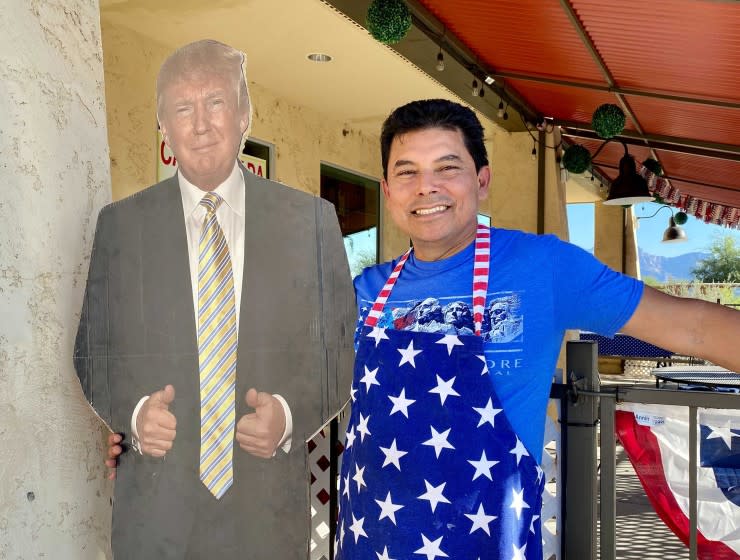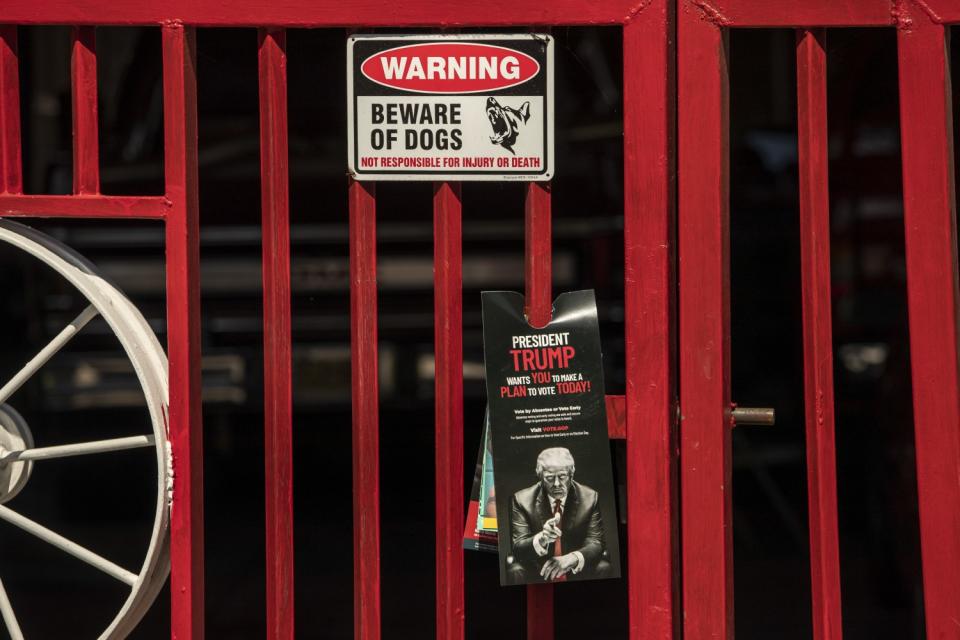These Latino voters are on a mission to persuade other Latinos to vote for Trump

Taking a break after the lunchtime rush, Jorge and Betty Rivas proudly pointed to their restaurant’s bestselling dish emblazoned on a red sign above the cash register — the MAGA burger. It’s described as a “HUGE!!” double patty with cheese, bacon, jalapeños, lettuce and special sauce.
Jorge, a Salvadoran immigrant, and Betty, a Mexican immigrant, run Sammy’s Mexican Grill, an eatery on the northern outskirts of the Tucson metropolitan area that doubles as something of a shrine to President Trump. Jorge Rivas, 53, a disaffected Democrat who voted for Obama in 2008, is a fervent Trump supporter.
“He wants a strong country,” Rivas said. “He wants the best for our country. He wants to keep America safe.”
Latino support for Trump may seem unexpected given the president’s anti-immigration platform and incendiary rhetoric about Latinos. Five years ago, Trump kicked off his presidential candidacy with a speech at Trump Tower that turned many of them off.
“When Mexico sends its people, they’re not sending their best…. They’re bringing drugs. They’re bringing crime. They’re rapists. And some, I assume, are good people,” Trump said.
Ever since, his relationship with many Latino voters has remained tense. But not with all.
In Arizona, a prime battleground where polls show Trump and Democrat Joe Biden running neck and neck, Luis Pimber — a Mexican immigrant — speaks at local Latino gatherings about why he’s a Republican.
The 50-year-old financial consultant, actor and former law enforcement officer is also featured in YouTube videos for the Lexit movement talking about why he supports Trump. Some are directed at Spanish-speaking voters. The Lexit Movement USA is a national organization of Latinos who are urging fellow Latinos to walk away from the Democratic Party and join the GOP.
“I support Donald Trump because he’s an entrepreneur. And us immigrants, like me — who came from Mexico — we came here and want to realize the American dream," Pimber says in Spanish. “Many of us do this by being entrepreneurs.”
Though Latinos traditionally support Democratic candidates, some say that their socially conservative values are increasingly coinciding with Republican principles, dispelling a long-held myth that Latinos are a monolith in the voting booth.
In 2016, Hillary Clinton won 66% of the Latino vote compared with Trump’s 28%, according to a study by the Pew Research Center. Polls this year have offered a range of estimates on Latino support for Biden and Trump, with some showing Trump doing somewhat better than in 2016. A large poll called the Cooperative Congressional Election Study, an academic survey, found Trump receiving 35%.

Some of these Latino Trump supporters have found a home in Lexit, which was formed in 2018 by a trio of conservative Latinos — all lapsed Democrats — who denounced what they called the “Democratic plantation of enslavement” in which Latino support was taken for granted.
Lexit Chairman Rey Torres, who is based in New York, described the group as a grass-roots organization run by volunteers and said he didn’t know exact membership numbers. Lexit’s Facebook page has nearly 250,000 followers.
Ronnie Lucero, a disaffected Democrat, operates out of his home office just north of Albuquerque where he oversees Lexit’s car rallies and media interviews. He also helps direct the Lexit Strike Force, a group of more than 100 volunteers who contact registered Latino voters in key battleground states such as Florida, Texas and Arizona, where turnout among Latinos could decide the outcome of this presidential election.
"We call and ask what's important to them and how they vote," Lucero wrote in a text. "I think Latinos/Hispanics are conservative in nature. The majority of us believe in the family unit, fear God [and are] pro-life, pro-2nd Amendment, freedom and less government control over the people. Those values align with our movement."
Lucero voted for Obama in 2008 but became disillusioned because he believed Obama and the Democratic Party were vilifying Americans who didn’t agree with their progressive ideas on race and gender, such as same-sex marriage. Also, his health insurance for his family of five increased from about $350 to $1,400 a month after the 2010 Patient Protection and Affordable Care Act was signed into law.
By 2012, he had abandoned the Democratic Party, but he couldn’t bring himself to vote for Trump.
“I couldn’t stand him, to be honest,” Lucero said.
But the car dealership finance manager said he did some research and came to believe that Trump’s comments had been misrepresented by the news media. He liked Trump’s tough stance against the North American Free Trade Agreement and his promises to bring manufacturing jobs back to the U.S.

Lucero now also co-hosts an online show for Lexit called “The Right Latinos.”
Although most polls show Biden holding a large lead over Trump among registered Latinos, their enthusiasm for Democrats has weakened, said Mike Madrid, a Latino Republican consultant with expertise in Latino voting patterns.
“They are leaving the Democratic Party, but that doesn’t mean they are becoming Republican. They are one of the fastest-growing segments of ‘decline to state,’” said Madrid, who helped form the Lincoln Project, a group of current and former Republican consultants who oppose Trump.
“It’s a problem because that means that they are not going to vote,” Madrid continued. “You have a party that doesn’t like you and a party that ignores you. Why vote?”
Madrid believes that, overall, Latino support for Trump is marginal.
Back in Arizona, the Rivas made headlines this year when a Facebook group posted a screen grab of Betty Rivas standing behind Trump at his Feb. 19 Phoenix campaign rally.
The couple said their restaurant became the target of negative online reviews and harassment on social media. But after Trump tweeted a shout-out to them, their business got a boost and they became more ardent in their support, adding more MAGA signs, Trump photos and a pastiche of the comic-book vigilante Punisher's skull logo with the president’s trademark hair along with a life-size cardboard cutout of him just outside the eatery’s entrance.
Recently, the pair joined a Latinos for Trump representative to knock on doors in Catalina, north of Tucson.
In 2008, Jorge Rivas said, he was excited to vote for Obama.
“I liked Obama back then,” he said in Spanish.
But, Rivas said, Obama turned out to be “too liberal.” He said Obama was too soft after the unrest in Ferguson, Mo., in 2014, sparked by the fatal shooting of Michael Brown by police officer Darren Wilson.
Obama “should have condemned the rioting and said, ‘No this is not right,’” Rivas said.
He said the images of unrest in Ferguson and around the country this summer after George Floyd’s killing triggered bad memories of his childhood during El Salvador’s civil war.
Rivas fled his home as a teen after his father was killed by a left-wing group, he said.
“I don’t understand how people can be so ignorant to want to do away with the police, with authorities. Maybe it’s because they’ve never lived what I have lived,” Rivas said, holding back tears. “For me it’s personal.”
This story originally appeared in Los Angeles Times.

